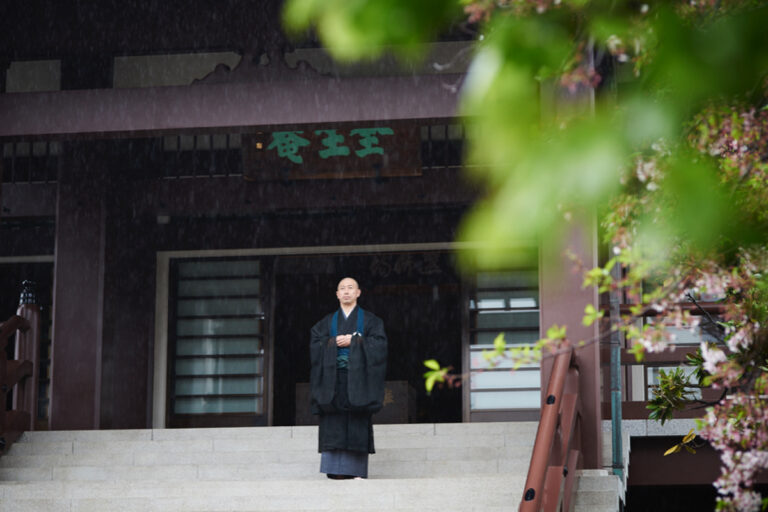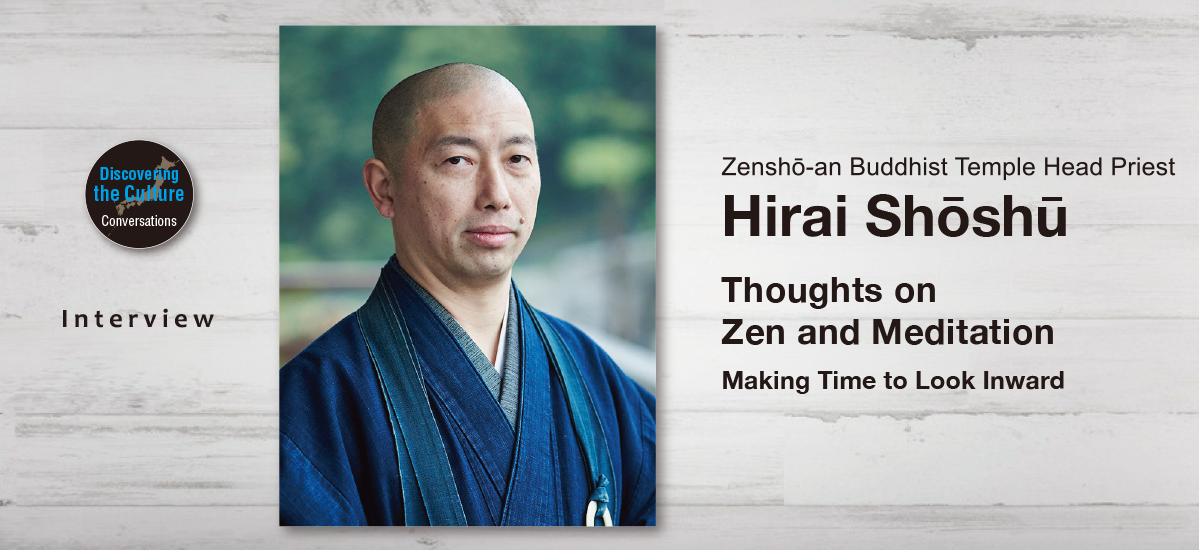
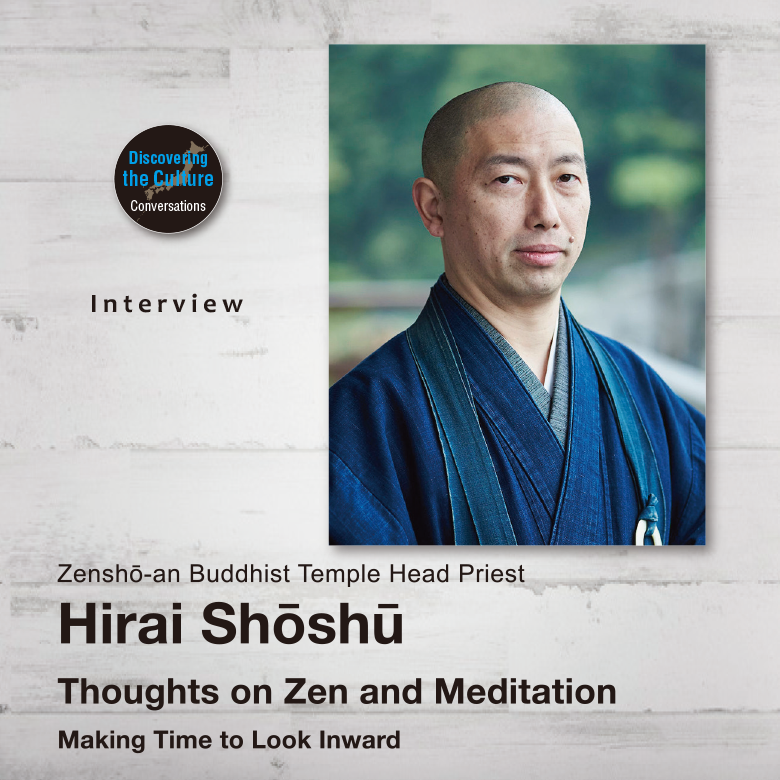
What is true wealth? What is true happiness? How can Zen meditation help us overcome our worries and distractions? Hirai Shōshū, head priest at Tokyo’s Zenshō-an Zen Buddhist temple, shares his thoughts.
Text : 村田保子 Yasuko Murata / English Version : Judy Evans
Keyword : Hirai Shōshū / Zenshō-an Temple / Zen Buddhism / Zazen / Meditation
Zenshō-an Temple Head Priest Hirai Shōshū
Hirai Shōshū of the Rinzai school of Zen Buddhism is the seventh head priest of Zenshō-an Temple in Tokyo and a visiting professor at Nihon University. He graduated from Gakushūin University in 1990 and trained at Ryūtaku-ji Hall for Monastic Training in Shizuoka Prefecture from 1990 – 2001. Since 2003, he has been head priest at the Kokutaiji-sect Zenshō-an Temple, where former Prime Ministers Abe Shinzō and Nakasone Yasuhiro have practised Zen meditation. Hirai Shōshū leads meditation and sutra-copying sessions at Zenshō-an Temple, and is the author of several books on Buddhism and spirituality.
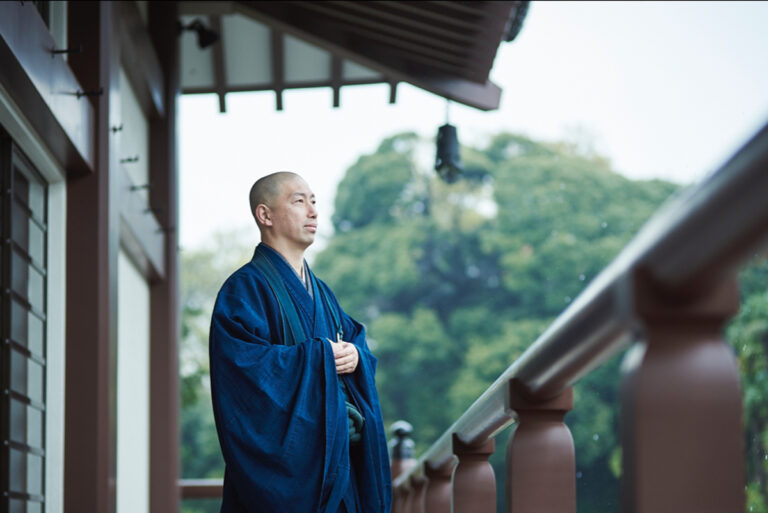
Zen helps us get back to the basics
I think that religions start out from the human desire for happiness. How each religion goes about achieving that differs, but I think that the desire to ease the mind is fundamental to any religion.
When we look at the world today, though, we see that differences in religion have become a source of conflict and discrimination. This is very sad. Why do people need to fight over religion? Perhaps we all need to get back to basics and focus on what really matters. With the evolution of transportation systems, there are so many different ways of moving people and things; societies have become more globalised, and we have achieved a great deal of economic development. But has the human spirit really kept up with all this? One would expect globalisation to have led to more acceptance of one another and to mutual respect for each other’s religions.
The biggest problem I see is that people’s jobs and daily activities occupy them to the extent that they don’t have time to explore their own spirituality. We’re human beings after all, and we need to deal with the question of spirituality. But despite that, so many people all over the world don’t have the time. So how does Zen fit into this?
There’s a saying that goes, ‘Zen is the name of the mind’. It means that Zen is actually the mind itself. Putting aside any talk of religion, Zen is about people themselves consciously calming their own minds.
What we most care about is people settling their hearts and minds — but that doesn’t make for much of a sound bite! Depending on how you explain it though, I think these ideas are relevant anywhere in the world — not just in Japan. I think Zen can help people in any part of the world grasp what it is that’s fundamental to humanity.
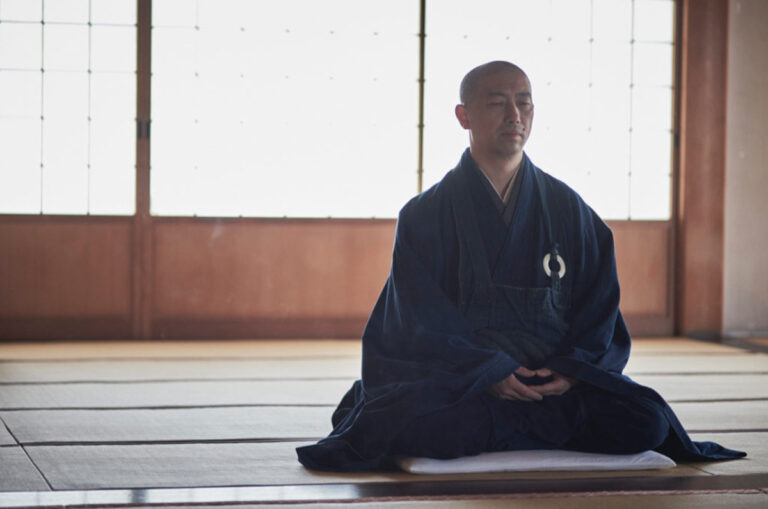
I’d love for everyone to try Zen meditation at least once
If you think about Japan as a country, we’re quite concerned about things that might become problems in the future like our aging society and pensions. But really, these concerns are not actually about the here and now; we’re preoccupied with vague anxieties about something that may or may not happen in the future.
This has probably been the case throughout the past, as well. We say that social inequality is rising in Japan, but compared with much of the rest of the world, we’re an equitable and wealthy country. How many places in the world can you turn on the tap and clean drinking water comes out? We use that water for cleaning, for flushing the toilet!
And yet, we’re fixated on these vague anxieties, and so many don’t appreciate the wealth that we have. So, I think after all, each individual needs to be mindful of their own spirituality. It’s not just about material wealth, we need spiritual wealth, too. Material wealth is relative, but spiritual wealth is something that everybody can feel, and that nobody can give us. Happiness isn’t something that we ‘become’, it’s something that we ‘feel’. I consider zazen (Zen meditation) to be one aspect of Zen practice that helps us experience that.
I would ask that every single person living in Japan experience zazen once. How people feel about that experience afterwards is a matter for the individual. But, if you’ve tried zazen just once, even if you don’t get it straight away, at some point, when you’re facing something difficult, think back to your zazen experience, and it can help you, even afterwards.
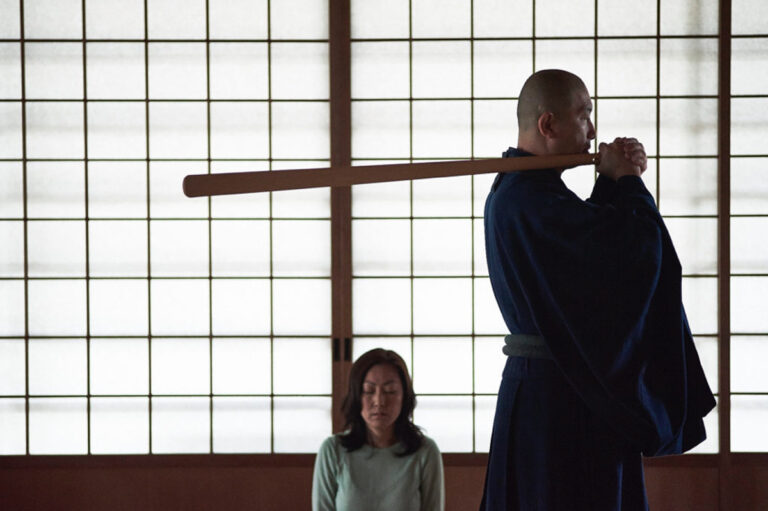
As interest in Zen grows, Zen temples are starting to reach out
In order to achieve that though, we need to help the general public understand a little more about Zen. I consider it our responsibility, as Zen priests, to provide those opportunities. Until now, Zen hasn’t really been what you might call outward-looking. The reason is that Zen isn’t something you can explain, and no matter how many opportunities to learn about it you might give someone, it may not be of any benefit to them if they aren’t purposefully seeking Zen.
However, the number of people taking part in the zazen sessions that I lead at Zenshō-an has been growing each year. There has also been a trend towards companies including zazen as part of their employee training. So people are seeking Zen, and I really do feel that Zen has become quite outward-looking in order to respond to this.
Moving forward, if we want Zen to be better understood, we priests also have to examine our own hearts and minds, and keep learning. Zen is about continually asking questions of one’s self, and I think we, as the ones offering the opportunity to learn about it, might also need to get back to basics.
